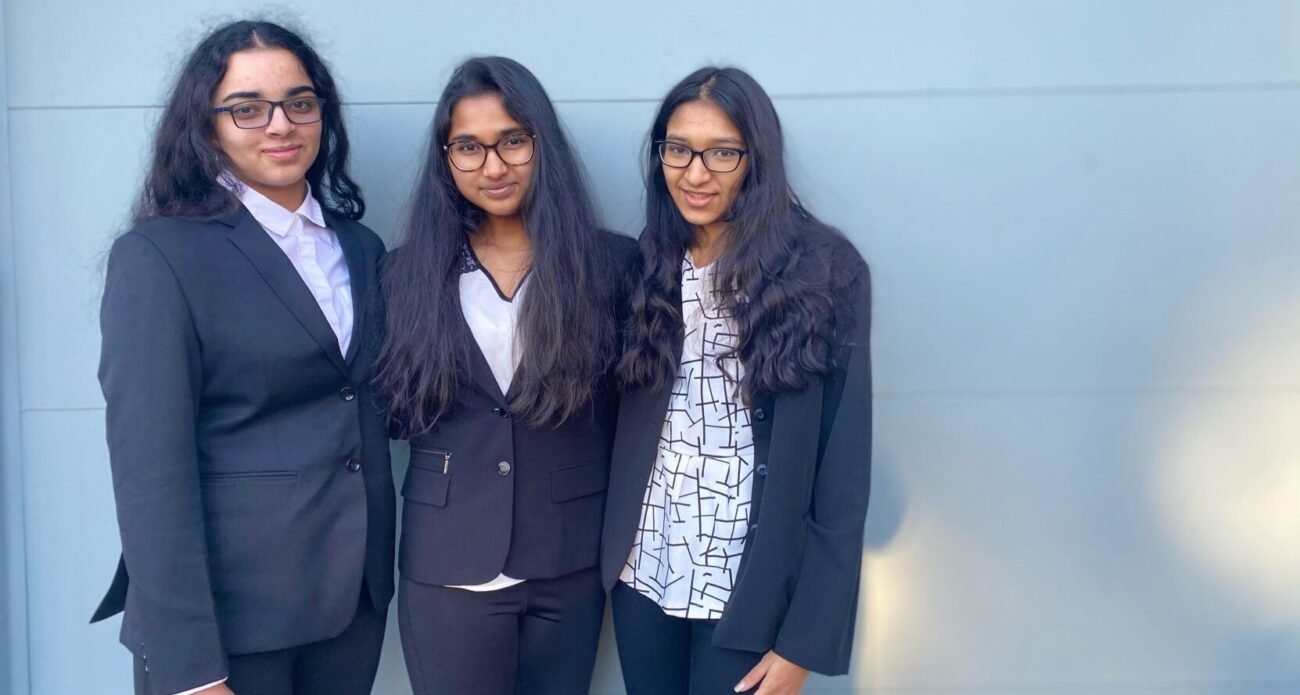
Three Indian American Teens from Illinois Launch ‘Project A Squared’ to Raise Awareness of ADHD
The co-founders of Project A Squared (l-r), Gulnaaz Sayyadhave, Meha Krishnareddigari, and Riya Khandelwal. (photo provided)
India-West Staff Reporter
A group of Indian American high school seniors from Stevenson High School in Lincolnshire, Illinois, have founded an organization to raise awareness of attention-deficit/hyperactivity disorder, commonly referred to as ADHD.
Riya Khandelwal, co-founder of the organization ‘Project A Squared: ADHD Awareness’, told India-West that as high school students, she and her co-founders – Meha Krishnareddigari and Gulnaaz Sayyadhave – worked over the course of the past year and a half to raise awareness and foster conversation regarding ADHD, an extremely common, yet often overlooked, neurodevelopmental disorder.
They have also partnered and become officiated ambassadors of CHADD, a nationwide organization dedicated to helping those with ADHD and their loved ones.
As students, Khandelwal noted, although they have moderate insight regarding ADHD from our health classes or personal experiences, they lack understanding of the sheer vastness of the condition itself and the stigmas associated with those who have the conditions and its counterpart, ADD. It is estimated that 8.4 percent of children and 2.5 percent of adults have ADHD, numbers that are only increasing, she added. That being said, 1 in 4 people still have not been diagnosed, making the condition vastly underdiagnosed.
Project A², or Project ADHD Awareness, aims to combat the stigmas associated with ADHD and explore the different ways to raise awareness and speak for the millions of people who are diagnosed with the condition. The project has a target demographic of 10-15 years of age in an effort to ensure that the next generation of adults is able to grasp the concept of this misunderstood condition to avoid stigmatizing it and better diagnose and treat it in the future.
“Our interest in ADHD stemmed from the sheer vastness of the condition itself combined with the misconceptions and stigma associated with it,” Khandelwal said. “When the average person is prompted with the question as to what ADHD is, all too often, the answer is a behavioral disorder stemming from ‘bad parenting’ or other unrelated misidentified causes.”
Khandelwal added that even some members of the Indian American community, when prompted, believed ADHD was simply “kids making trouble.” Hence the need to combat these stigmas, she added.
Community partners of Project A² include Future Doctors of America, a club within Stevenson High aiming to provide students opportunities to explore the world of medicine and the outside factors that affect it. Activities include learning about medical careers, health related subjects, listening to guest speakers, dissecting, etc.
Another partnership they secured is with Future Public Health Leaders, an organization for student leaders interested in healthcare to campaign and fundraise for global health issues. Due to the fact that ADHD is a neurodevelopmental disorder, Khandelwal said they found that presenting to health-related clubs such as FDA and FPHL garnered an effective audience within their target demographic. Their most vital collaboration, however, is with Children and Adults with Attention-Deficit/Hyperactivity Disorder, a national organization founded in 1987 in response to the sense of isolation experienced by those with ADHD. During the team’s ongoing partnership and sponsorship with CHADD, they have fostered diverse facets of awareness, including creating an Innerview (youth volunteering) page, devising social media outlets, organizing service events with ADHD professionals, and, most vitally, spreading their Project’s message throughout the community and state.
Khandelwal told India-West that in terms of accomplishments to date, they have fostered over 16,841 interactions within the community, received a selective Hershey Heartwarming Action Grant of $250, as well as partnered with COO April-Gower Getz to be featured exclusively as CHADD’s high school ambassadors.
“Our team concluded one of the primary reasons ADHD is underdiagnosed is due to stigmas associated with it along with general misunderstandings as to what ADHD is,” Khandelwal noted. “Therefore, the most vital point of our project was eliminating the stigma associated with ADHD. This was achieved through interactive myth-busting presentations, long-lasting partnerships, as well as informative events, which fostered everlasting impacts on our community.”
The team’s plan going forward includes hosting more service and interactive events. To learn more about their cause and ADHD, please visit https://linktr.ee/projectasquared.




